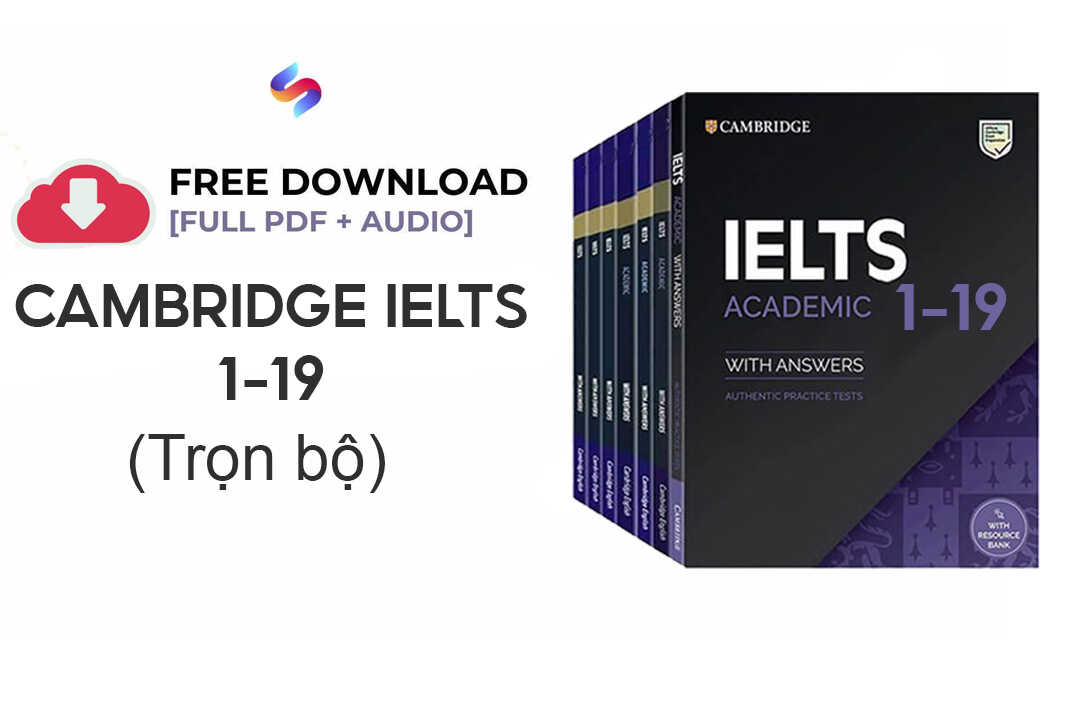Thầy giáo Nguyễn Anh Đức Là một chuyên gia đầy đam mê trong lĩnh vực giảng dạy tiếng Anh và phát triển tiềm năng con người, thầy Nguyễn Anh Đức được mệnh danh là “phù thủy tiếng Anh” nhờ những phương pháp sáng tạo và hiệu quả. Với tầm nhìn đổi mới giáo dục, thầy không ngừng ứng dụng công nghệ hiện đại như thực tế ảo và trí tuệ nhân tạo để mang đến trải nghiệm học tập độc đáo. Là diễn giả truyền cảm hứng, thầy đã khích lệ hàng chục nghìn học sinh, sinh viên và thanh niên trên hành trình chinh phục tiếng Anh và vượt qua giới hạn bản thân. Mục tiêu lớn nhất của thầy là xây dựng một thế hệ trẻ tự tin, làm chủ ngôn ngữ và sẵn sàng vươn ra thế giới.
Nhằm đáp ứng nhu cầu tìm hiểu các giải đáp chi tiết đối với các câu hỏi IELTS mới nhất, Smartcom English xin tiếp tục giới thiệu tới các sĩ tử IELTS bài giảng phân tích chi tiết kèm theo bài viết mẫu ở thang điểm cao cho kỹ năng Viết ở Bài luận số 2 đề số 2 trong cuốn Cambridge 19.
Tải miễn phí: Ebook giải đề IELTS Writing CAMBRIDGE 19 (PDF)
You have approximately 40 minutes to complete this task.
You need to write an essay addressing the topic below:
The working week should be shorter and workers should have a longer weekend.
Do you agree or disagree?
Give reasons for your answer and include any relevant examples from your own knowledge or experience.
Your essay should comprise a minimum of 250 words.
Bước 1: Đọc kỹ câu hỏi và phân tích kỹ đề bài đã cho
– Dịch đề bài: để giúp bạn hiểu đúng đề bài, Smartcom English xin dịch lại đề cụ thể như sau: ” Tuần làm việc nên được rút ngắn hơn và các cán bộ công, nhân viên nên có ngày nghỉ cuối tuần dài hơn. Bạn đồng ý hay không đồng ý?”
– Từ khóa chính: Tuần làm việc, nên được rút ngắn, nhân viên, nên có ngày nghỉ cuối tuần dài hơn.
– Nhiệm vụ phải trình bày: Đưa ra quan điểm hoàn toàn đồng ý hay hoàn toàn không đồng ý.
Bước 2: Lên dàn ý và chuẩn bị từ vựng cần thiết
Hoàn toàn đồng ý (Completely agree)
1. Improved Work-Life Balance (Cải thiện cân bằng giữa Công việc-Cuộc sống): More time for family, hobbies, and relaxation.
2. Increased Productivity (Nâng cao hiệu suất làm việc): More focused and efficient work within fewer hours.
3. Health Benefits (Lợi ích về sức khoẻ): Reduced stress and burnout, leading to better physical and mental health.
4. Environmental Benefits (Lợi ích về môi trường): Fewer commutes reduce carbon emissions and energy consumption.
5. Economic Benefits (Lợi ích về kinh tế): Employees have more time to spend on leisure activities, boosting local economies.
Hoàn toàn không đồng ý (Completely disagree)
1. Economic Impact on Businesses (Ảnh hưởng về kinh tế đối với các doanh nghiệp): Reduced working hours might lead to decreased output and revenue for businesses.
2. Challenges in Implementation (Thách thức trong thực thi): Difficulty in adjusting schedules and workflows to accommodate shorter weeks.
3. Potential for Increased Workload (Tiềm ẩn gia tăng khối lượng công việc): Employees might face more intense work periods to compensate for fewer working days.
4. Inequality Among Different Sectors (Bất công giữa các ban ngành/ lĩnh vực khác nhau): Not all industries can adopt a shorter workweek, leading to discrepancies in work conditions.
5. Impact on Customer Service (Ảnh hưởng đối với ngành Dịch vụ Chăm sóc khách hàng): Reduced availability of services could lead to customer dissatisfaction.
Bài viết mẫu
In today’s fast-paced work environment, the concept of reducing the working week and extending the weekend is increasingly being discussed. I firmly agree with the proposition that a shorter working week and a longer weekend would be highly advantageous. This shift would enhance work-life balance, boost productivity, and benefit the environment.
Firstly, a shorter working week would significantly improve work-life balance. Employees would have more time to spend with their beloved ones, pursue personal interests, and engage in leisure activities. This additional personal time can reduce stress and prevent burnout, leading to a happier and more fulfilled workforce. For example, countries like Sweden and Finland, where shorter working hours are being tested, report higher levels of employee satisfaction and well-being.
Secondly, reducing the working week can lead to increased productivity. When employees work fewer days, they tend to be more focused and efficient during their working hours. This concept emphasizes quality over quantity, where the output is optimized within a shorter timeframe. Microsoft Japan’s experiment with a four-day workweek is a prime example, where the company saw a 40% increase in productivity. Such evidence suggests that a compressed work schedule can yield better results without compromising work quality.
Thirdly, a shorter working week can have positive environmental impacts. With reduced commuting days, there would be a significant decrease in carbon emissions from vehicles. Offices would also consume less energy, contributing to lower overall utility costs and a smaller carbon footprint. Companies adopting shorter working weeks have reported lower energy consumption and operational costs, highlighting the environmental benefits of such a shift.
In conclusion, a shorter working week and a longer weekend would bring numerous advantages, including improved work-life balance, increased productivity, and environmental benefits. Therefore, I strongly advocate for businesses and policymakers to consider implementing shorter working weeks to create a more sustainable and thriving work environment.
Word count: 307
Đánh giá bài viết theo 4 tiêu chí chấm điểm
Task Response: 8/9
Bài viết đã trả lời đầy đủ yêu cầu của đề bài, nêu rõ quan điểm đồng ý với đề xuất về tuần làm việc ngắn hơn và cuối tuần dài hơn. Người viết đã đưa ra ba lý do chính bao gồm cải thiện cân bằng cuộc sống – công việc, tăng năng suất, và lợi ích môi trường, đồng thời minh chứng bằng các ví dụ thực tế từ Thụy Điển, Phần Lan và thí nghiệm của Microsoft Nhật Bản.
Coherence and Cohesion: 8/9
Bài viết có sự tổ chức mạch lạc với các ý tưởng chính được phân chia rõ ràng qua từng đoạn văn. Mỗi đoạn đều bắt đầu với câu chủ đề rõ ràng và được phát triển một cách hợp lý. Người viết đã sử dụng từ nối như “Firstly,” “Secondly,” và “Thirdly” để cấu trúc bài viết một cách logic.
Lexical Resource: 8/9
Người viết sử dụng một lượng từ vựng phong phú và phù hợp với chủ đề, như “work-life balance,” “boost productivity,” “carbon emissions,” và “compressed work schedule.” Những từ ngữ này thể hiện một sự hiểu biết rõ ràng về ngôn ngữ học thuật.
Grammatical Range and Accuracy: 8/9
Người viết đã thể hiện khả năng sử dụng đa dạng cấu trúc câu, từ câu đơn đến câu phức. Các cấu trúc ngữ pháp được sử dụng chính xác trong hầu hết các trường hợp, ví dụ như “With reduced commuting days, there would be a significant decrease in carbon emissions.”
Overall: 8.0
Bài viết đã hoàn thành tốt nhiệm vụ với các luận điểm rõ ràng, mạch lạc, có tính liên kết và sử dụng từ vựng học thuật phong phú. Mặc dù còn một số lỗi nhỏ về ngữ pháp và có thể mở rộng thêm phần phản biện, bài viết vẫn thể hiện một sự thuyết phục rõ ràng và phù hợp với yêu cầu của đề bài.
Từ vựng cần học
In today’s fast-paced work environment (Phrase) /ɪn təˈdeɪz fæst peɪst wɜrk ɪnˈvaɪrənmənt/ Trong môi trường làm việc phát tiển nhanh chóng ngày nay
The concept of (Phrase) /ðə ˈkɒn.sɛpt ʌv/ Khái niệm về
Firmly agree (Phrase) /ˈfɜr.mli əˈɡriː/ Hoàn toàn đồng ý
The proposition that (Phrase) /ðə ˌprɒp.əˈzɪʃ.ən ðæt/ Đề xuất rằng
Work-life balance (Noun Phrase) /wɜrk laɪf ˈbæl.əns/ Cân bằng công việc và cuộc sống
Productivity (Noun) /prɒdʌkˈtɪv.ɪ.ti/ Năng suất
Beloved ones (Noun Phrase) /bɪˈlʌvd wʌnz/ Những người thân yêu
Engage in (Verb Phrase) /ɪnˈɡeɪdʒ ɪn/ Tham gia vào
Burnout (Noun) /ˈbɜrn.aʊt/ Kiệt sức
Fulfilled (Adjective) /fʊlˈfɪld/ Được thỏa mãn, hoàn thành
Workforce (Noun) /ˈwɜrkˌfɔrs/ Lực lượng lao động
Satisfaction (Noun) /ˌsæt.ɪsˈfæk.ʃən/ Sự hài lòng
Well-being (Noun) /ˈwɛlˌbiː.ɪŋ/ Sự khỏe mạnh, hạnh phúc
Efficient (Adjective) /ɪˈfɪʃ.ənt/ Hiệu quả
Emphasizes (Verb) /ˈɛm.fə.saɪzɪz/ Nhấn mạnh
Quality over quantity (Phrase) /ˈkwɒl.ɪ.ti ˈoʊ.vərˈkwɒn.tɪ.ti/ Chất lượng hơn số lượng
Optimized (Adjective) /ˈɒp.tɪ.maɪzd/ Tối ưu hóa
Timeframe (Noun) /ˈtaɪm.freɪm/ Khung thời gian
A prime example (Phrase) /ə praɪm ɪɡˈzæm.pəl/ Một ví dụ điển hình
A compressed work schedule (Noun Phrase) /ə kəmˈprɛst wɜrk ˈskɛdʒuːl/ Lịch làm việc nén
Yield (Verb) /jiːld/ Đem lại, sản xuất
Compromise (Verb) /ˈkɒmprəmaɪz/ Làm hại, thỏa hiệp
Work quality (Noun Phrase) /wɜrk ˈkwɒl.ɪ.ti/ Chất lượng công việc
Impacts (Noun/Verb) /ˈɪm.pækt/ Tác động
Emissions (Noun) /ɪˈmɪʃ.ənz/ Khí thải
Utility costs (Noun Phrase) /juˈtɪl.ɪ.ti kɔsts/ Chi phí tiện ích
Carbon (Noun) /ˈkɑːr.bən/ Carbon
Footprint (Noun) /ˈfʊt.prɪnt/ Dấu chân, tác động môi trường
Adopt (Verb) /əˈdɒpt/ Áp dụng, nhận nuôi
Operational costs (Noun Phrase) /ˌɒp.əˈreɪ.ʃənəl kɔsts/ Chi phí hoạt động
Shift (Noun/Verb) /ʃɪft/ Ca làm việc; Thay đổi
Advocate (Verb/Noun) /ˈæd.və.keɪt/ Biện hộ; Người ủng hộ
Policymakers (Noun) /ˈpɒl.ɪ.siˌmeɪ.kərz/ Các nhà làm chính sách
Implementing (Verb) /ˈɪm.plɪ.men.tɪŋ/ Thực hiện
Sustainable (Adjective) /səˈsteɪ.nə.bəl/ Bền vững
Thriving (Adjective) /ˈθraɪ.vɪŋ/ Phát triển mạnh mẽ
Tham khảo thêm: Kỹ thuật Paraphrasing: Quy tắc & ứng dụng trong IELTS
Hy vọng là bài giảng giải đề IELTS Cambridge 19: Chi tiết Writing Task 2 [Test 2] trên của các chuyên gia IELTS tại Smartcom English đã cung cấp cho bạn cái nhìn tổng thể, và lời giải chi tiết cho câu hỏi về dạng Argumentative/ Opinion essay. Bài viết không đi sâu vào ý tưởng phức tạp hay từ vựng khó, mà chỉ tập trung giải quyết ý tưởng dễ thấy và từ vựng hữu ích, dễ dùng và ưu tiên chuỗi logic trong cách lập luận.
Để học sâu hơn các bài giảng này, bạn cần đến lớp học trực tiếp hoặc sử dụng hệ thống giảng dạy online của Smartcom English để hấp thụ nhanh và sâu hơn kiến thức viết IELTS, đồng thời học theo chuỗi bài có tính logic, và hệ thống hóa, giúp dễ nhớ và nắm được vấn đề một cách toàn diện hơn.
Tham gia nhóm hỗ trợ IELTS từ chuyên gia của Smartcom English: Tại đây
Nếu bạn đang có câu hỏi “học IELTS ở đâu tốt” và nỗi lo về chi phí học IELTS vẫn làm bạn chần chừ, thì Smartcom chính là câu trả lời. Với lộ trình học phù hợp từng cá nhân và mức phí hợp lý, bạn hoàn toàn có thể học mà không lo áp lực tài chính.
By: Smartcom English – IELTS experts
Kết nối với mình qua
Bài viết khác

![Ảnh nền đường dẫn điều hướng của bài viết Giải đề IELTS Cambridge 19: Chi tiết Writing Task 2 [Test 2]](https://smartcom.vn/blog/wp-content/uploads/2024/07/ielts-writing-task-2-cambridge-19.png)
![[PDF + Audio] Tải Sách IELTS Cambridge 19 (Kèm đáp án)](https://smartcom.vn/blog/wp-content/uploads/2024/06/ielts-cambridge-19_optimized.png)



![[PDF + Audio] Tải Sách IELTS Cambridge 16 (Kèm đáp án)](https://smartcom.vn/blog/wp-content/uploads/2024/07/ielts-cambridge-16-pdf_optimized.jpg)









